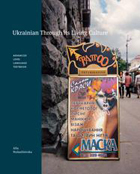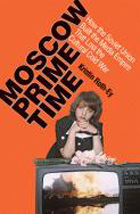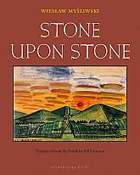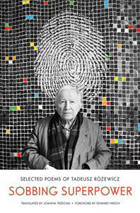Book Prize Winners for 2012
BEST CONTRIBUTION TO LANGUAGE PEDAGOGY
Nedashkivska, Alla. Ukrainian Through Its Living Culture.
Edmonton [Alberta], Canada: The University of Alberta Press, 2010.
 Out of a strong field of submissions the committee is pleased to recognize Ukrainian Through Its Living Culture by Alla Nedashkivska as the winner of 2012 AATSEEL Book Prize for Best Contribution to Language Pedagogy.
Out of a strong field of submissions the committee is pleased to recognize Ukrainian Through Its Living Culture by Alla Nedashkivska as the winner of 2012 AATSEEL Book Prize for Best Contribution to Language Pedagogy.
As a textbook for upper-level students of Ukrainian, Alla Nedashkivka's Ukrainian Through Its Living Culture is an ambitious project for a rather select market. At the same time, it may provide a solution to the vexed problem of upper-level textbooks for the less commonly taught languages. Each of the nine theme-based chapters has been divided into two sections, with "part I" designed to accommodate the intermediate-level language learner and "part II" the advanced-level one, thus allowing for two "tours" of the same textbook over the course of multiple semesters, with additional suggestions for use in study abroad programs. The textbook also includes a set of five, well-organized appendices (those on classroom vocabulary, grammar and orthographic conventions are particularly excellent), and there is an attractive website with additional materials, including workbook and listening exercises. Offering a range of materials and language inputs, Nedashkivka's textbook promises to be an important new resource for intermediate and advanced students of Ukrainian.
BEST BOOK IN LITERARY/CULTURAL STUDIES
Roth-Ey, Kristin. Moscow Prime Time: How the Soviet Union Built the Media Empire That Lost the Cultural Cold War.
Ithaca, NY: Cornell University Press, 2011.
 With Moscow Prime Time: How the Soviet Union Built the Media Empire that Lost the Cultural Cold War, Kristin Roth-Ey has written an ambitious, original, and fascinating account of Soviet film, television, and radio in the 1950s, 60s, and 70s, when the Soviet Union cultivated a mass culture intended to rival western dominance internationally. To her considerable credit, Roth-Ey's does not tell the typical story of a Soviet Cold War failure, however. Indeed, the very success of the Soviet mass culture enterprise upended cultural politics, individual freedoms, and public tastes in unexpected ways. Adducing evidence from archives, interviews, and printed sources, Roth-Ey convincingly argues that during those three transformative decades, as sundry forms of public experience became private, Soviet culture gradually came to mirror those of its western counterpart. Meticulously researched, well-written, and extremely engaging, Moscow Prime Time is an extraordinary "must read" for students and scholars of 20th-century history and culture.
With Moscow Prime Time: How the Soviet Union Built the Media Empire that Lost the Cultural Cold War, Kristin Roth-Ey has written an ambitious, original, and fascinating account of Soviet film, television, and radio in the 1950s, 60s, and 70s, when the Soviet Union cultivated a mass culture intended to rival western dominance internationally. To her considerable credit, Roth-Ey's does not tell the typical story of a Soviet Cold War failure, however. Indeed, the very success of the Soviet mass culture enterprise upended cultural politics, individual freedoms, and public tastes in unexpected ways. Adducing evidence from archives, interviews, and printed sources, Roth-Ey convincingly argues that during those three transformative decades, as sundry forms of public experience became private, Soviet culture gradually came to mirror those of its western counterpart. Meticulously researched, well-written, and extremely engaging, Moscow Prime Time is an extraordinary "must read" for students and scholars of 20th-century history and culture.
BEST LITERARY TRANSLATION INTO ENGLISH
Mysliwski, Wieslaw. Stone Upon Stone.
Brooklyn: Archipelago Books, 2010. Translated from the Polish by Bill Johnston.
 Bill Johnston's Stone upon Stone is a monumental achievement in the art of translation—and not only because the novel is huge and begins and ends with a tomb. Wieslaw Mysliwski's Kamien na kamieniu, widely considered one of the best works of postwar Polish literature, conveys a rich array of history, human experience, and literary delight through the narrative voice of Szymek Pietruszka, a garrulous peasant, steady but nimble, simple but shrewd, sensitive but unsentimental. Johnston's translation renders this compelling voice with no lapse in tone, no excessive sophistication or stylized coarseness, but rather an unobtrusive balance that perfectly fits the narrator's outlook. The English reader has been in Bill Johnston's debt before, and is now once again.
Bill Johnston's Stone upon Stone is a monumental achievement in the art of translation—and not only because the novel is huge and begins and ends with a tomb. Wieslaw Mysliwski's Kamien na kamieniu, widely considered one of the best works of postwar Polish literature, conveys a rich array of history, human experience, and literary delight through the narrative voice of Szymek Pietruszka, a garrulous peasant, steady but nimble, simple but shrewd, sensitive but unsentimental. Johnston's translation renders this compelling voice with no lapse in tone, no excessive sophistication or stylized coarseness, but rather an unobtrusive balance that perfectly fits the narrator's outlook. The English reader has been in Bill Johnston's debt before, and is now once again.
BEST SCHOLARLY TRANSLATION INTO ENGLISH
Różewicz, Tadeusz. Sobbing Superpower: Selected Poems of Tadeusz Różewicz.
New York, NY: W. W. Norton & Company, 2011. Translated from the Polish by Joanna Trzeciak.
 Sobbing Superpower: The Selected Poems of Tadeusz Różewiczis the first collection in English to encompass the poet's full career, from his first collection Anxiety (Nepokój, 1947) to the tender poem addressed to his son, "Mystery that Grows," dated 2008. As the reader learns in Anxiety, Różewicz is a "survivor": "I'm twenty-four / Led to slaughter / I survived." Różewicz's stark, minimalist anti-poetry, with its abrupt shifts and pregnant silences, "justifies nothing/ explains nothing / renounces nothing / encompasses no whole / fulfills no hope" ("My Poetry," 1965). Part of the remarkable generation of poets that includes Szymborska and Herbert (and Milosz, an older contemporary), Różewicz redefined the essence and form of poetry after the Holocaust. In addition to her hauntingly spare translations of this major poet, Joanna Trzeciak provides extensive notes that shed light on subjects ranging from Ezra Pound to Polish history and literature, as well as a biographical note and foreword by Edward Hirsch. With Sobbing Superpower, Trzeciak joins the remarkable cohort of translators who have made it possible for the English reader to enjoy the riches of contemporary Polish poetry.
Sobbing Superpower: The Selected Poems of Tadeusz Różewiczis the first collection in English to encompass the poet's full career, from his first collection Anxiety (Nepokój, 1947) to the tender poem addressed to his son, "Mystery that Grows," dated 2008. As the reader learns in Anxiety, Różewicz is a "survivor": "I'm twenty-four / Led to slaughter / I survived." Różewicz's stark, minimalist anti-poetry, with its abrupt shifts and pregnant silences, "justifies nothing/ explains nothing / renounces nothing / encompasses no whole / fulfills no hope" ("My Poetry," 1965). Part of the remarkable generation of poets that includes Szymborska and Herbert (and Milosz, an older contemporary), Różewicz redefined the essence and form of poetry after the Holocaust. In addition to her hauntingly spare translations of this major poet, Joanna Trzeciak provides extensive notes that shed light on subjects ranging from Ezra Pound to Polish history and literature, as well as a biographical note and foreword by Edward Hirsch. With Sobbing Superpower, Trzeciak joins the remarkable cohort of translators who have made it possible for the English reader to enjoy the riches of contemporary Polish poetry.
